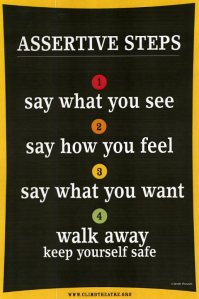Assertiveness Skills
Dear Ally,
At my school, we teach our students to demonstrate dignity and respect for everyone, including themselves. We encourage students to use their voices to stick up for themselves, others, and for what they believe. The communication style that creates mutual respect is call assertiveness and I wish I had more of it when I was in college and I’ll admit it is a skill I’m still developing.
In college, I was mostly passive and wouldn’t speak up if something bothered me because I didn’t want to cause conflict. I also think it was partly because of my mid-western culture to be extremely polite at all costs. I think back to times when my fun freshmen year roommates and I went dancing uptown. It wasn’t uncommon for a random guy who had consumed enough liquid courage to go up behind a girl who was dancing and start grinding away. I remember one such night vividly. We were dancing in our little circle of four when suddenly there was some dude definitely dancing too close to me. I looked across to my roommate, Sandy, with wide eyes that pleaded, “Please help me!” She knew just what to do and grabbed me and dragged me off the dance floor. From then on I always strategically positioned myself with my back to wall. Recalling that situation and other times that I was uncomfortable and didn’t say anything makes me cringe. Why didn’t I say that I’m not interested or why didn’t I simply walk away. Because I didn’t want to be rude? Because I might get called a bitch?
Assertiveness is expressing your feelings and beliefs honestly and straightforwardly in a calm manner. It’s using “I” statements against which there is no argument. It’s also about listening to others and not stepping on them, which would be aggressive. Assertiveness takes practice, but once obtained, can increase your confidence and self-esteem so that you will learn to value your own experience and wisdom.
So, stay in control of your situation, only say yes if that’s what you want, say no without feeling guilty, and if your clear and assertive “no” does not get the message across, throw an elbow.
Don’t let anybody walk all over you,
Aunt Sarah
Intro to Time Management Woes
Dear Ally,
This whole week is fall break at my school, so it’s quiet here while students and faculty are off campus relaxing and getting caught up.
Time is similar to space in that they’re both finite and need to be organized, used wisely, and sometimes be multipurpose. One of the first steps to getting more of either is looking at everything you’ve got and getting rid of the crap that’s not useful or doesn’t make you happy.
As a professor, I see two main issues with which students with poor time management skills struggle. I see those who fail to meet deadlines because they lost track of the due dates, this is a lack or organization and planning, and students who never have enough time because they either lack efficiency, allow themselves to procrastinate, or are over-committed.
If due dates are sneaking up on you and causing panic, find a way to keep track and remind yourself. When I was in college, I used a paper planner and one of my favorite things about a new semester was writing down all the exam dates and assignment due dates in it. Now I use the calendar in Outlook, which I can view on a computer or my phone. I am grateful for the reminder feature of Outlook and the reminders app in my phone. Reminders from professors are a courtesy to students and should never be expected.
Once you have your tasks and corresponding due dates recorded, think about how long it will take to do them, always overestimating. Work backwards from the deadline allotting so much time per day/week to figure out when you need to get started. I give chemistry exams covering three chapters once a month. I recommend students study half a chapter a day and leave the day before the exam to do practice exams and one final overall review. To do this, they need to begin studying one week before the exam. If you have a large assignment, break it up into pieces and set due dates for the completion of each part. Set aside down time and time for yourself because you shouldn’t feel like you have to be busy all the time.
The best laid plans can go awry, if they are not or cannot be followed. Be sure you haven’t bitten off more than you can chew. If you’re sleeping less than 6 hours a night for more than 2 or 3 nights in a row, something has to go. You might have to say no to someone or temporarily cut out an activity. If lack of motivation is a problem and procrastination creeps in, reward yourself for meeting those due dates you set. I get M&M’s for grading.
If you’ve done everything you can to cut your schedule down to the bare minimum and there’s still not enough hours in the day, consider recording your usage of time for a few days or a week. You may find small amounts of time here or there that could be better spent add up. Maybe you get to class 10-15 minutes early and could use that time to complete a few homework problems. Perhaps you’re spending more time doing certain things than you realized. Every now and then I have to go on a Facebook fast and logout for a week or two. If you still don’t find activities to cut, then you need to increase your efficiency by combining activities and multitasking. Smart phones can be a distraction, but they can also turn any time spent waiting into productive time, if you take advantage of study apps, like Brainscape, or if you can access course materials on-line.
Time management is a skill learned and developed over time. Many schools have time management skills workshops, so if you have the opportunity to participate in one, it will be worth your time. There should always be time to improve your time management skills.
Good luck!
Aunt Sarah
Jeremy Spoke in Class Today
Dear Ally,
It’s throwback week and I actually have a distinct memory of a significant current event that occurred almost exactly 20 years ago, during my first year of college. Oct. 3, 1995 was the day the O.J. Simpson not guilty verdict was announced. I didn’t watch much of the trial, but many students even skipped class to watch. The afternoon the announcement was made, I was on my way to calculus class, the one my friend, Mark, was taking with me. As I walked down my hallway, I heard cheering and peeked at the TV through an open door and could see the courtroom scene. It was a warm sunny day and most of the windows were open in the dorms, so on my way up Mort Hill, there was cheering coming out the open windows and many African American students were celebrating and shouting, “Not guilty!”
So now I think about what you’ll remember from your first semester in college and think of the shooting that occurred last Friday in Oregon. It’s a very different world we live in today. My freshmen year of college, school shootings happened in Pearl Jam videos, not the news. The Columbine shooting happened the spring I graduated from college. When the Virginia Tech massacre occurred, I was fresh out of grad school and in my first year of teaching. My hope for you is that when you look back 20 years from now and remember this time, this senseless killing will be a thing of the past.
In a faculty meeting today we were discussing what we could do to protect ourselves and our students, if faced with a similar situation, and how could we keep violence off our campus. You’re probably thinking similar thoughts. We cannot live in fear, but we must be as prepared as possible, to have a plan and to think about what if. My advice to you and your classmates is to stay alert, pay attention, and stick together. Say something if you hear something, read something, or see something suspicious. Bring up the issue in class and ask your professors and administrators, if there is a plan. If your school has an emergency alert system, sign up for it. If there are emergency practices and drills, be sure to participate in them. If there are no plans or practice drills, demand them. Student voices will be heard, especially if there are many.
There are many schools of thought about what to do, if something goes down, but I know what I’d do. If I could get out, I would, and then I’d run, I’d run like hell and just keep running. If I couldn’t get out, I’d lock the door or barricade it as best as I could and then hide, but not before grabbing up anything I could throw or swing to protect myself and my students.
I have one last piece of advice for today. If you have classes with any military veterans, it wouldn’t be a bad idea to get to know them. Start by thanking them for their service.
I hope that you’ll never actually need any of this advice.
Be smart and stay safe,
Aunt Sarah


